Nursing Management Plan for Glenda's Chronic Kidney Disease Case Study
VerifiedAdded on 2022/09/21
|11
|2646
|17
Report
AI Summary
This assignment provides a comprehensive analysis of Glenda's chronic kidney disease (CKD) case. It begins with a nursing handover, detailing her transfer from Royal Darwin Hospital to the Wurrumiyang Clinic on Tiwi Island, including her history of hemodialysis and subsequent switch to peritoneal dialysis. The report then includes a personal response to the renal team's decision, considering the patient's cultural needs, preferences, and the advantages of peritoneal dialysis. Finally, a detailed nursing management plan is presented, outlining diagnoses, pharmacology (including the use of Extraneal), self-care strategies, the role of a multidisciplinary team, prioritization of care, immediate clinical responsibilities, and potential risks like peritonitis and hernia. The assignment emphasizes holistic care, patient-centered approaches, and the importance of considering cultural and personal factors in medical decision-making.

Running Head: GLENDA CHRONIC KIDNEY DISEASE
Glenda Chronic kidney disease
Student Name
Tutor
Date
Glenda Chronic kidney disease
Student Name
Tutor
Date
Paraphrase This Document
Need a fresh take? Get an instant paraphrase of this document with our AI Paraphraser
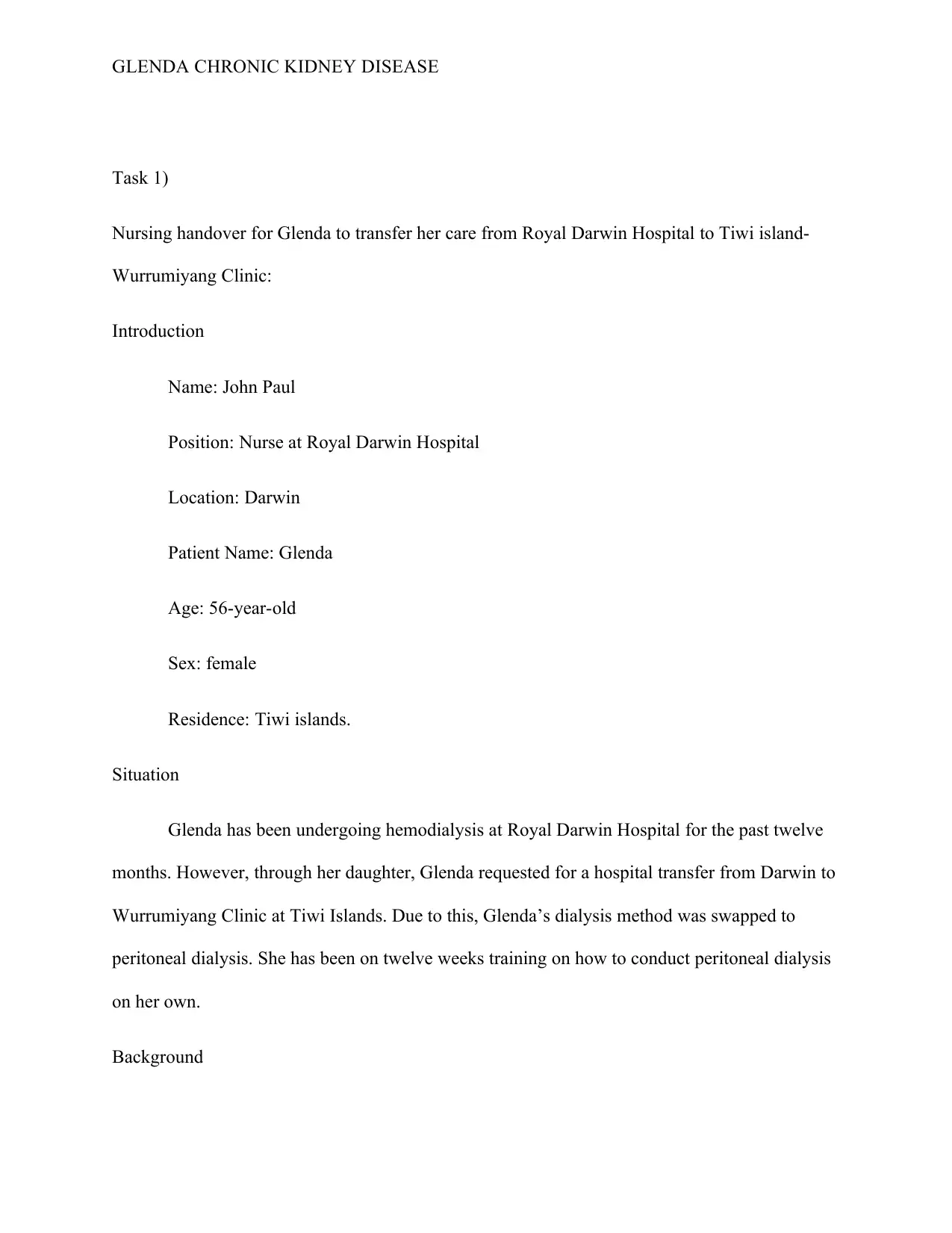
GLENDA CHRONIC KIDNEY DISEASE
Task 1)
Nursing handover for Glenda to transfer her care from Royal Darwin Hospital to Tiwi island-
Wurrumiyang Clinic:
Introduction
Name: John Paul
Position: Nurse at Royal Darwin Hospital
Location: Darwin
Patient Name: Glenda
Age: 56-year-old
Sex: female
Residence: Tiwi islands.
Situation
Glenda has been undergoing hemodialysis at Royal Darwin Hospital for the past twelve
months. However, through her daughter, Glenda requested for a hospital transfer from Darwin to
Wurrumiyang Clinic at Tiwi Islands. Due to this, Glenda’s dialysis method was swapped to
peritoneal dialysis. She has been on twelve weeks training on how to conduct peritoneal dialysis
on her own.
Background
Task 1)
Nursing handover for Glenda to transfer her care from Royal Darwin Hospital to Tiwi island-
Wurrumiyang Clinic:
Introduction
Name: John Paul
Position: Nurse at Royal Darwin Hospital
Location: Darwin
Patient Name: Glenda
Age: 56-year-old
Sex: female
Residence: Tiwi islands.
Situation
Glenda has been undergoing hemodialysis at Royal Darwin Hospital for the past twelve
months. However, through her daughter, Glenda requested for a hospital transfer from Darwin to
Wurrumiyang Clinic at Tiwi Islands. Due to this, Glenda’s dialysis method was swapped to
peritoneal dialysis. She has been on twelve weeks training on how to conduct peritoneal dialysis
on her own.
Background
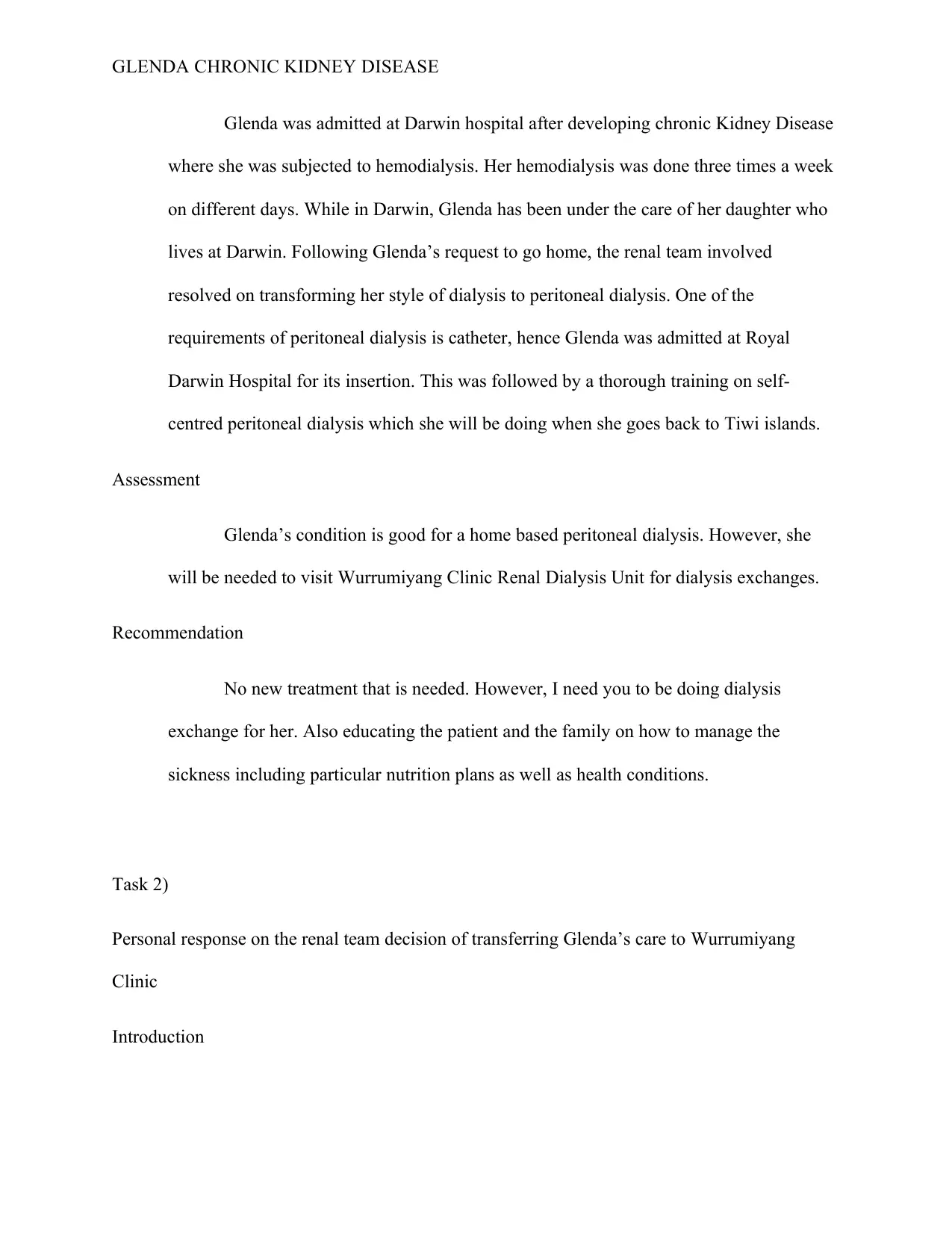
GLENDA CHRONIC KIDNEY DISEASE
Glenda was admitted at Darwin hospital after developing chronic Kidney Disease
where she was subjected to hemodialysis. Her hemodialysis was done three times a week
on different days. While in Darwin, Glenda has been under the care of her daughter who
lives at Darwin. Following Glenda’s request to go home, the renal team involved
resolved on transforming her style of dialysis to peritoneal dialysis. One of the
requirements of peritoneal dialysis is catheter, hence Glenda was admitted at Royal
Darwin Hospital for its insertion. This was followed by a thorough training on self-
centred peritoneal dialysis which she will be doing when she goes back to Tiwi islands.
Assessment
Glenda’s condition is good for a home based peritoneal dialysis. However, she
will be needed to visit Wurrumiyang Clinic Renal Dialysis Unit for dialysis exchanges.
Recommendation
No new treatment that is needed. However, I need you to be doing dialysis
exchange for her. Also educating the patient and the family on how to manage the
sickness including particular nutrition plans as well as health conditions.
Task 2)
Personal response on the renal team decision of transferring Glenda’s care to Wurrumiyang
Clinic
Introduction
Glenda was admitted at Darwin hospital after developing chronic Kidney Disease
where she was subjected to hemodialysis. Her hemodialysis was done three times a week
on different days. While in Darwin, Glenda has been under the care of her daughter who
lives at Darwin. Following Glenda’s request to go home, the renal team involved
resolved on transforming her style of dialysis to peritoneal dialysis. One of the
requirements of peritoneal dialysis is catheter, hence Glenda was admitted at Royal
Darwin Hospital for its insertion. This was followed by a thorough training on self-
centred peritoneal dialysis which she will be doing when she goes back to Tiwi islands.
Assessment
Glenda’s condition is good for a home based peritoneal dialysis. However, she
will be needed to visit Wurrumiyang Clinic Renal Dialysis Unit for dialysis exchanges.
Recommendation
No new treatment that is needed. However, I need you to be doing dialysis
exchange for her. Also educating the patient and the family on how to manage the
sickness including particular nutrition plans as well as health conditions.
Task 2)
Personal response on the renal team decision of transferring Glenda’s care to Wurrumiyang
Clinic
Introduction
⊘ This is a preview!⊘
Do you want full access?
Subscribe today to unlock all pages.

Trusted by 1+ million students worldwide
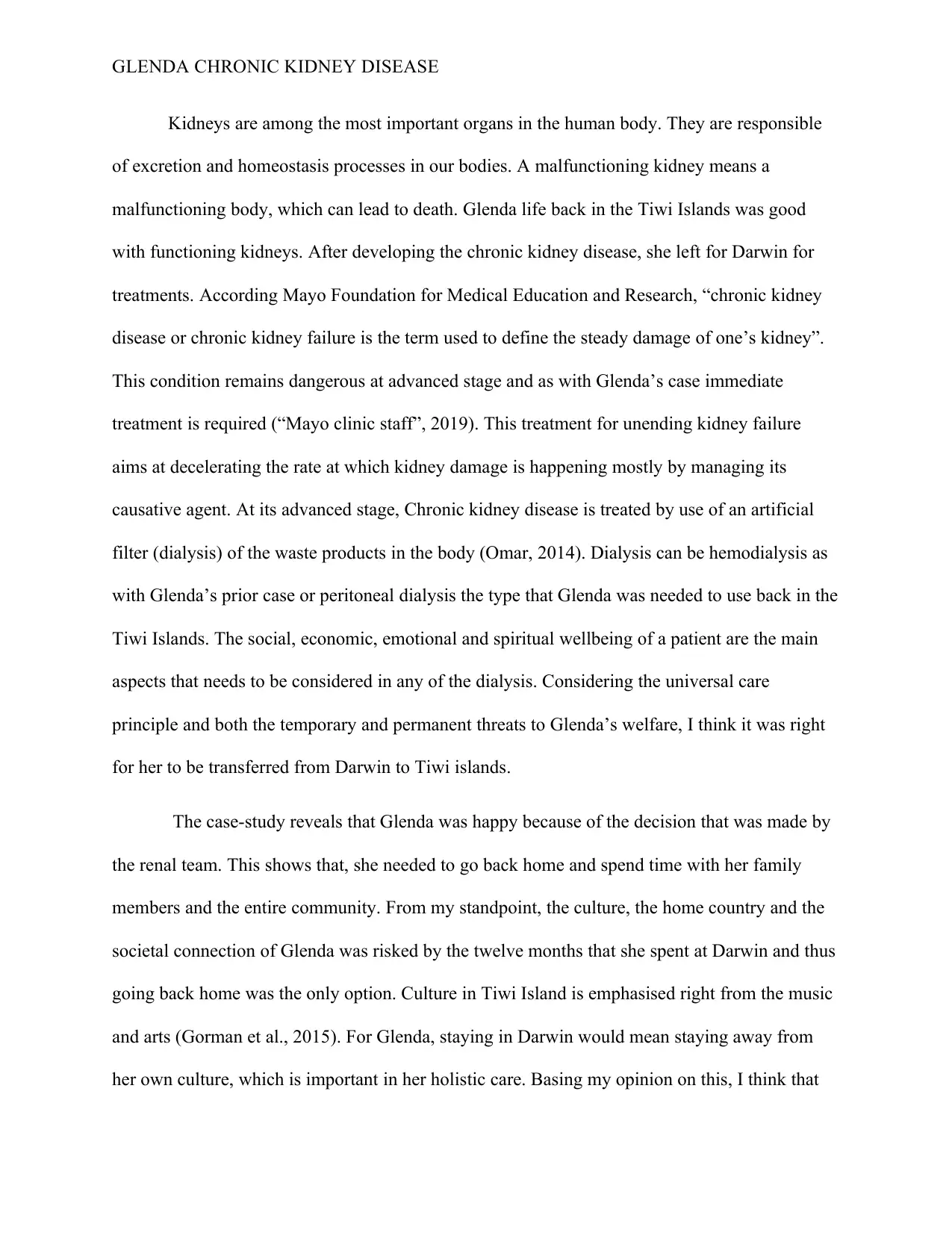
GLENDA CHRONIC KIDNEY DISEASE
Kidneys are among the most important organs in the human body. They are responsible
of excretion and homeostasis processes in our bodies. A malfunctioning kidney means a
malfunctioning body, which can lead to death. Glenda life back in the Tiwi Islands was good
with functioning kidneys. After developing the chronic kidney disease, she left for Darwin for
treatments. According Mayo Foundation for Medical Education and Research, “chronic kidney
disease or chronic kidney failure is the term used to define the steady damage of one’s kidney”.
This condition remains dangerous at advanced stage and as with Glenda’s case immediate
treatment is required (“Mayo clinic staff”, 2019). This treatment for unending kidney failure
aims at decelerating the rate at which kidney damage is happening mostly by managing its
causative agent. At its advanced stage, Chronic kidney disease is treated by use of an artificial
filter (dialysis) of the waste products in the body (Omar, 2014). Dialysis can be hemodialysis as
with Glenda’s prior case or peritoneal dialysis the type that Glenda was needed to use back in the
Tiwi Islands. The social, economic, emotional and spiritual wellbeing of a patient are the main
aspects that needs to be considered in any of the dialysis. Considering the universal care
principle and both the temporary and permanent threats to Glenda’s welfare, I think it was right
for her to be transferred from Darwin to Tiwi islands.
The case-study reveals that Glenda was happy because of the decision that was made by
the renal team. This shows that, she needed to go back home and spend time with her family
members and the entire community. From my standpoint, the culture, the home country and the
societal connection of Glenda was risked by the twelve months that she spent at Darwin and thus
going back home was the only option. Culture in Tiwi Island is emphasised right from the music
and arts (Gorman et al., 2015). For Glenda, staying in Darwin would mean staying away from
her own culture, which is important in her holistic care. Basing my opinion on this, I think that
Kidneys are among the most important organs in the human body. They are responsible
of excretion and homeostasis processes in our bodies. A malfunctioning kidney means a
malfunctioning body, which can lead to death. Glenda life back in the Tiwi Islands was good
with functioning kidneys. After developing the chronic kidney disease, she left for Darwin for
treatments. According Mayo Foundation for Medical Education and Research, “chronic kidney
disease or chronic kidney failure is the term used to define the steady damage of one’s kidney”.
This condition remains dangerous at advanced stage and as with Glenda’s case immediate
treatment is required (“Mayo clinic staff”, 2019). This treatment for unending kidney failure
aims at decelerating the rate at which kidney damage is happening mostly by managing its
causative agent. At its advanced stage, Chronic kidney disease is treated by use of an artificial
filter (dialysis) of the waste products in the body (Omar, 2014). Dialysis can be hemodialysis as
with Glenda’s prior case or peritoneal dialysis the type that Glenda was needed to use back in the
Tiwi Islands. The social, economic, emotional and spiritual wellbeing of a patient are the main
aspects that needs to be considered in any of the dialysis. Considering the universal care
principle and both the temporary and permanent threats to Glenda’s welfare, I think it was right
for her to be transferred from Darwin to Tiwi islands.
The case-study reveals that Glenda was happy because of the decision that was made by
the renal team. This shows that, she needed to go back home and spend time with her family
members and the entire community. From my standpoint, the culture, the home country and the
societal connection of Glenda was risked by the twelve months that she spent at Darwin and thus
going back home was the only option. Culture in Tiwi Island is emphasised right from the music
and arts (Gorman et al., 2015). For Glenda, staying in Darwin would mean staying away from
her own culture, which is important in her holistic care. Basing my opinion on this, I think that
Paraphrase This Document
Need a fresh take? Get an instant paraphrase of this document with our AI Paraphraser
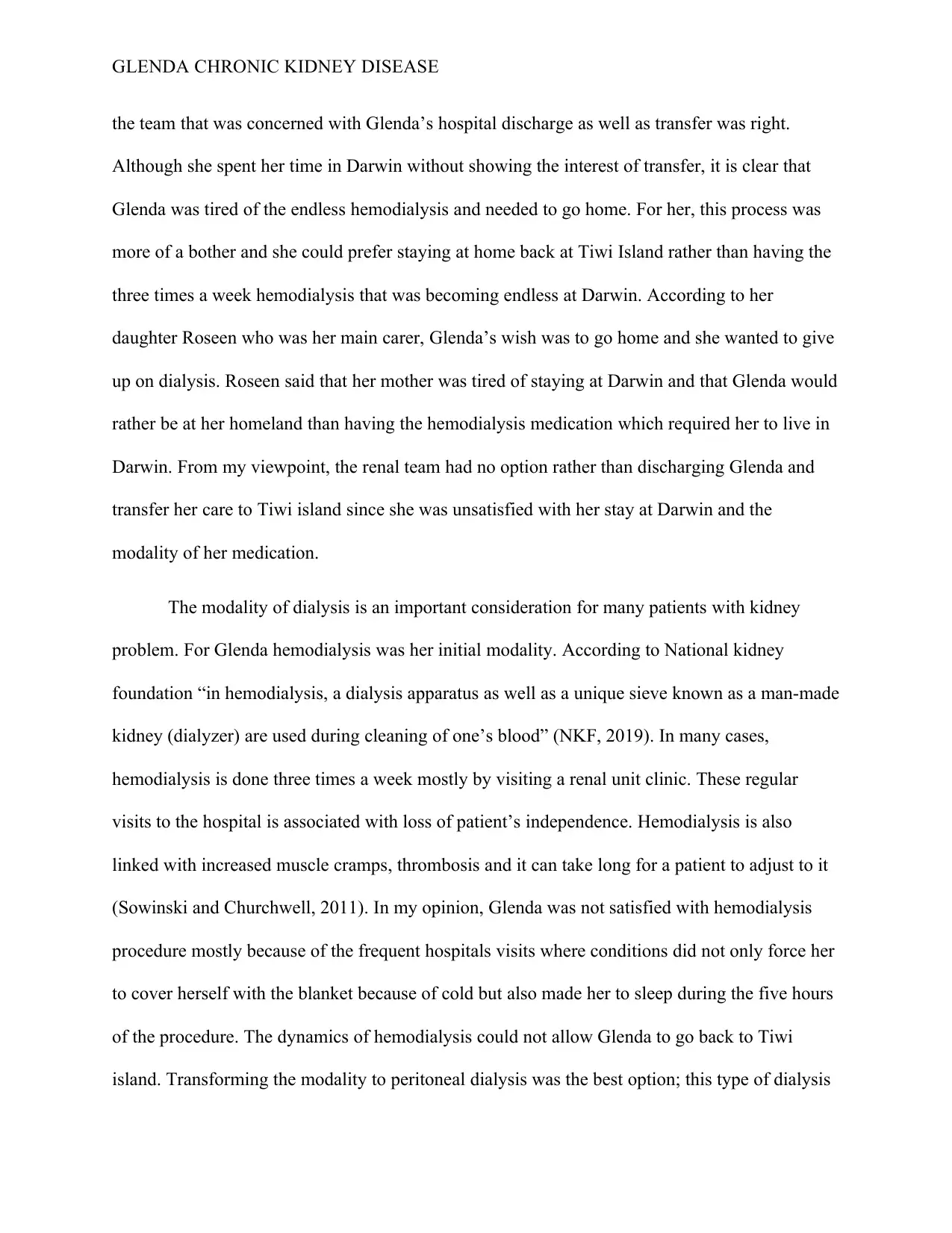
GLENDA CHRONIC KIDNEY DISEASE
the team that was concerned with Glenda’s hospital discharge as well as transfer was right.
Although she spent her time in Darwin without showing the interest of transfer, it is clear that
Glenda was tired of the endless hemodialysis and needed to go home. For her, this process was
more of a bother and she could prefer staying at home back at Tiwi Island rather than having the
three times a week hemodialysis that was becoming endless at Darwin. According to her
daughter Roseen who was her main carer, Glenda’s wish was to go home and she wanted to give
up on dialysis. Roseen said that her mother was tired of staying at Darwin and that Glenda would
rather be at her homeland than having the hemodialysis medication which required her to live in
Darwin. From my viewpoint, the renal team had no option rather than discharging Glenda and
transfer her care to Tiwi island since she was unsatisfied with her stay at Darwin and the
modality of her medication.
The modality of dialysis is an important consideration for many patients with kidney
problem. For Glenda hemodialysis was her initial modality. According to National kidney
foundation “in hemodialysis, a dialysis apparatus as well as a unique sieve known as a man-made
kidney (dialyzer) are used during cleaning of one’s blood” (NKF, 2019). In many cases,
hemodialysis is done three times a week mostly by visiting a renal unit clinic. These regular
visits to the hospital is associated with loss of patient’s independence. Hemodialysis is also
linked with increased muscle cramps, thrombosis and it can take long for a patient to adjust to it
(Sowinski and Churchwell, 2011). In my opinion, Glenda was not satisfied with hemodialysis
procedure mostly because of the frequent hospitals visits where conditions did not only force her
to cover herself with the blanket because of cold but also made her to sleep during the five hours
of the procedure. The dynamics of hemodialysis could not allow Glenda to go back to Tiwi
island. Transforming the modality to peritoneal dialysis was the best option; this type of dialysis
the team that was concerned with Glenda’s hospital discharge as well as transfer was right.
Although she spent her time in Darwin without showing the interest of transfer, it is clear that
Glenda was tired of the endless hemodialysis and needed to go home. For her, this process was
more of a bother and she could prefer staying at home back at Tiwi Island rather than having the
three times a week hemodialysis that was becoming endless at Darwin. According to her
daughter Roseen who was her main carer, Glenda’s wish was to go home and she wanted to give
up on dialysis. Roseen said that her mother was tired of staying at Darwin and that Glenda would
rather be at her homeland than having the hemodialysis medication which required her to live in
Darwin. From my viewpoint, the renal team had no option rather than discharging Glenda and
transfer her care to Tiwi island since she was unsatisfied with her stay at Darwin and the
modality of her medication.
The modality of dialysis is an important consideration for many patients with kidney
problem. For Glenda hemodialysis was her initial modality. According to National kidney
foundation “in hemodialysis, a dialysis apparatus as well as a unique sieve known as a man-made
kidney (dialyzer) are used during cleaning of one’s blood” (NKF, 2019). In many cases,
hemodialysis is done three times a week mostly by visiting a renal unit clinic. These regular
visits to the hospital is associated with loss of patient’s independence. Hemodialysis is also
linked with increased muscle cramps, thrombosis and it can take long for a patient to adjust to it
(Sowinski and Churchwell, 2011). In my opinion, Glenda was not satisfied with hemodialysis
procedure mostly because of the frequent hospitals visits where conditions did not only force her
to cover herself with the blanket because of cold but also made her to sleep during the five hours
of the procedure. The dynamics of hemodialysis could not allow Glenda to go back to Tiwi
island. Transforming the modality to peritoneal dialysis was the best option; this type of dialysis
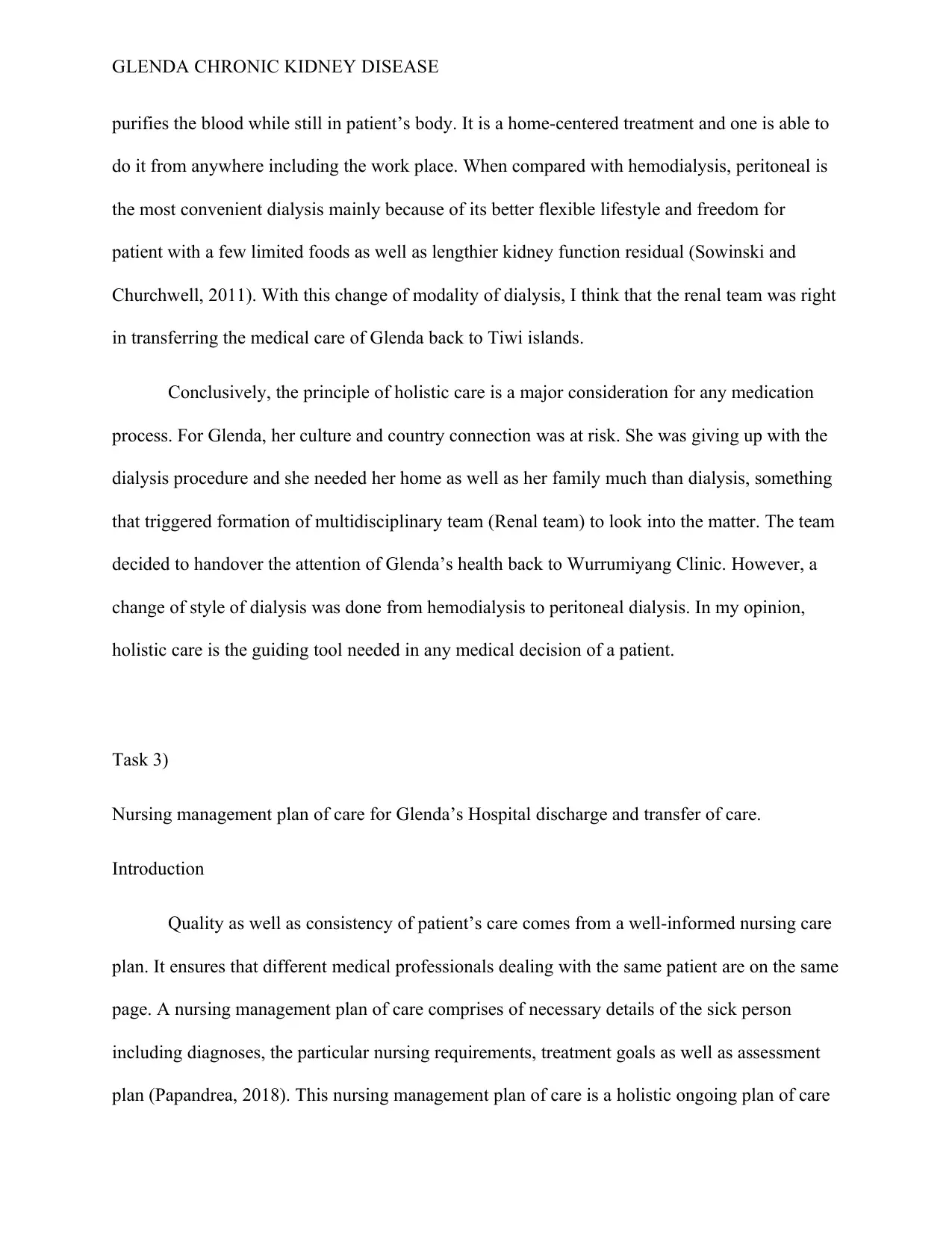
GLENDA CHRONIC KIDNEY DISEASE
purifies the blood while still in patient’s body. It is a home-centered treatment and one is able to
do it from anywhere including the work place. When compared with hemodialysis, peritoneal is
the most convenient dialysis mainly because of its better flexible lifestyle and freedom for
patient with a few limited foods as well as lengthier kidney function residual (Sowinski and
Churchwell, 2011). With this change of modality of dialysis, I think that the renal team was right
in transferring the medical care of Glenda back to Tiwi islands.
Conclusively, the principle of holistic care is a major consideration for any medication
process. For Glenda, her culture and country connection was at risk. She was giving up with the
dialysis procedure and she needed her home as well as her family much than dialysis, something
that triggered formation of multidisciplinary team (Renal team) to look into the matter. The team
decided to handover the attention of Glenda’s health back to Wurrumiyang Clinic. However, a
change of style of dialysis was done from hemodialysis to peritoneal dialysis. In my opinion,
holistic care is the guiding tool needed in any medical decision of a patient.
Task 3)
Nursing management plan of care for Glenda’s Hospital discharge and transfer of care.
Introduction
Quality as well as consistency of patient’s care comes from a well-informed nursing care
plan. It ensures that different medical professionals dealing with the same patient are on the same
page. A nursing management plan of care comprises of necessary details of the sick person
including diagnoses, the particular nursing requirements, treatment goals as well as assessment
plan (Papandrea, 2018). This nursing management plan of care is a holistic ongoing plan of care
purifies the blood while still in patient’s body. It is a home-centered treatment and one is able to
do it from anywhere including the work place. When compared with hemodialysis, peritoneal is
the most convenient dialysis mainly because of its better flexible lifestyle and freedom for
patient with a few limited foods as well as lengthier kidney function residual (Sowinski and
Churchwell, 2011). With this change of modality of dialysis, I think that the renal team was right
in transferring the medical care of Glenda back to Tiwi islands.
Conclusively, the principle of holistic care is a major consideration for any medication
process. For Glenda, her culture and country connection was at risk. She was giving up with the
dialysis procedure and she needed her home as well as her family much than dialysis, something
that triggered formation of multidisciplinary team (Renal team) to look into the matter. The team
decided to handover the attention of Glenda’s health back to Wurrumiyang Clinic. However, a
change of style of dialysis was done from hemodialysis to peritoneal dialysis. In my opinion,
holistic care is the guiding tool needed in any medical decision of a patient.
Task 3)
Nursing management plan of care for Glenda’s Hospital discharge and transfer of care.
Introduction
Quality as well as consistency of patient’s care comes from a well-informed nursing care
plan. It ensures that different medical professionals dealing with the same patient are on the same
page. A nursing management plan of care comprises of necessary details of the sick person
including diagnoses, the particular nursing requirements, treatment goals as well as assessment
plan (Papandrea, 2018). This nursing management plan of care is a holistic ongoing plan of care
⊘ This is a preview!⊘
Do you want full access?
Subscribe today to unlock all pages.

Trusted by 1+ million students worldwide
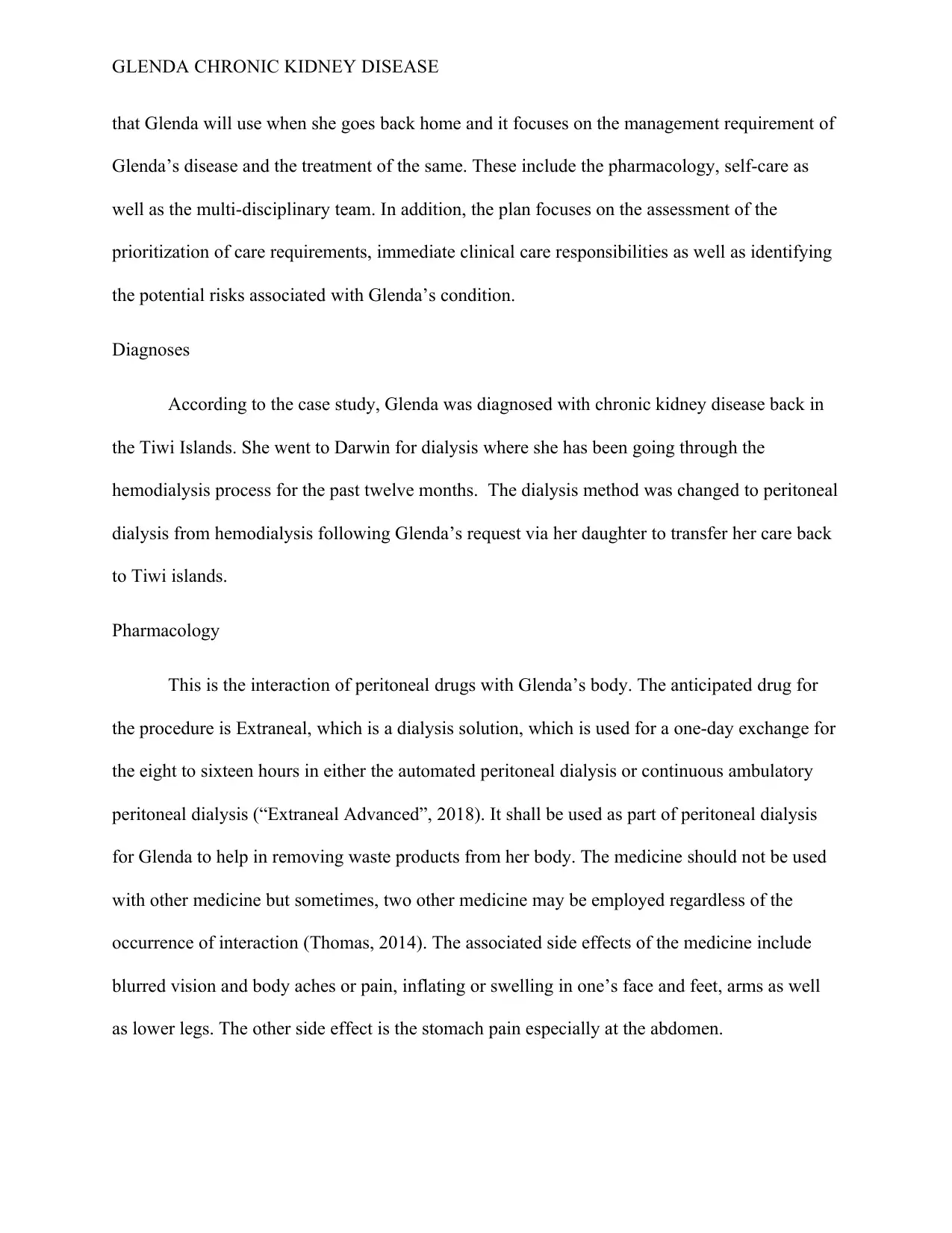
GLENDA CHRONIC KIDNEY DISEASE
that Glenda will use when she goes back home and it focuses on the management requirement of
Glenda’s disease and the treatment of the same. These include the pharmacology, self-care as
well as the multi-disciplinary team. In addition, the plan focuses on the assessment of the
prioritization of care requirements, immediate clinical care responsibilities as well as identifying
the potential risks associated with Glenda’s condition.
Diagnoses
According to the case study, Glenda was diagnosed with chronic kidney disease back in
the Tiwi Islands. She went to Darwin for dialysis where she has been going through the
hemodialysis process for the past twelve months. The dialysis method was changed to peritoneal
dialysis from hemodialysis following Glenda’s request via her daughter to transfer her care back
to Tiwi islands.
Pharmacology
This is the interaction of peritoneal drugs with Glenda’s body. The anticipated drug for
the procedure is Extraneal, which is a dialysis solution, which is used for a one-day exchange for
the eight to sixteen hours in either the automated peritoneal dialysis or continuous ambulatory
peritoneal dialysis (“Extraneal Advanced”, 2018). It shall be used as part of peritoneal dialysis
for Glenda to help in removing waste products from her body. The medicine should not be used
with other medicine but sometimes, two other medicine may be employed regardless of the
occurrence of interaction (Thomas, 2014). The associated side effects of the medicine include
blurred vision and body aches or pain, inflating or swelling in one’s face and feet, arms as well
as lower legs. The other side effect is the stomach pain especially at the abdomen.
that Glenda will use when she goes back home and it focuses on the management requirement of
Glenda’s disease and the treatment of the same. These include the pharmacology, self-care as
well as the multi-disciplinary team. In addition, the plan focuses on the assessment of the
prioritization of care requirements, immediate clinical care responsibilities as well as identifying
the potential risks associated with Glenda’s condition.
Diagnoses
According to the case study, Glenda was diagnosed with chronic kidney disease back in
the Tiwi Islands. She went to Darwin for dialysis where she has been going through the
hemodialysis process for the past twelve months. The dialysis method was changed to peritoneal
dialysis from hemodialysis following Glenda’s request via her daughter to transfer her care back
to Tiwi islands.
Pharmacology
This is the interaction of peritoneal drugs with Glenda’s body. The anticipated drug for
the procedure is Extraneal, which is a dialysis solution, which is used for a one-day exchange for
the eight to sixteen hours in either the automated peritoneal dialysis or continuous ambulatory
peritoneal dialysis (“Extraneal Advanced”, 2018). It shall be used as part of peritoneal dialysis
for Glenda to help in removing waste products from her body. The medicine should not be used
with other medicine but sometimes, two other medicine may be employed regardless of the
occurrence of interaction (Thomas, 2014). The associated side effects of the medicine include
blurred vision and body aches or pain, inflating or swelling in one’s face and feet, arms as well
as lower legs. The other side effect is the stomach pain especially at the abdomen.
Paraphrase This Document
Need a fresh take? Get an instant paraphrase of this document with our AI Paraphraser
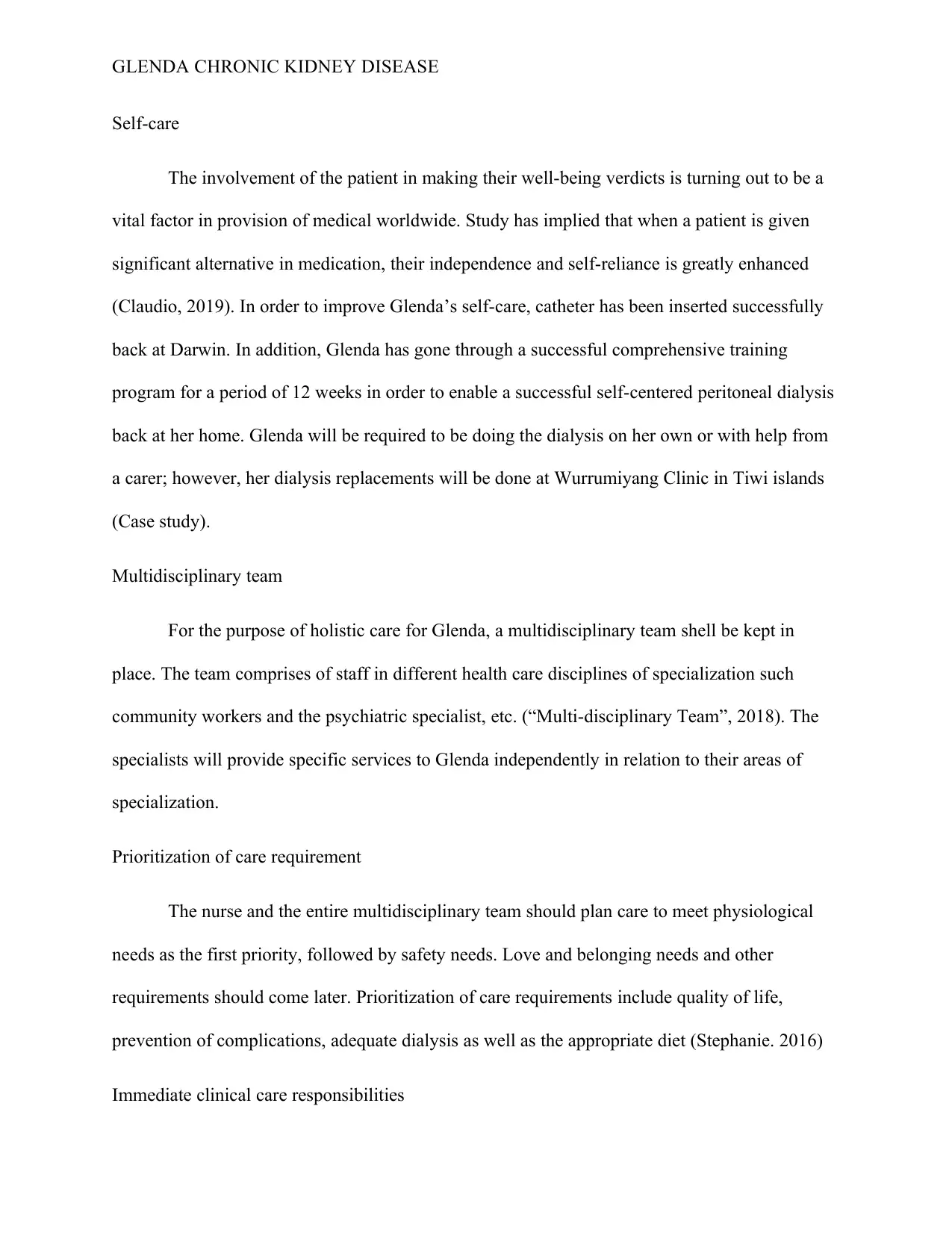
GLENDA CHRONIC KIDNEY DISEASE
Self-care
The involvement of the patient in making their well-being verdicts is turning out to be a
vital factor in provision of medical worldwide. Study has implied that when a patient is given
significant alternative in medication, their independence and self-reliance is greatly enhanced
(Claudio, 2019). In order to improve Glenda’s self-care, catheter has been inserted successfully
back at Darwin. In addition, Glenda has gone through a successful comprehensive training
program for a period of 12 weeks in order to enable a successful self-centered peritoneal dialysis
back at her home. Glenda will be required to be doing the dialysis on her own or with help from
a carer; however, her dialysis replacements will be done at Wurrumiyang Clinic in Tiwi islands
(Case study).
Multidisciplinary team
For the purpose of holistic care for Glenda, a multidisciplinary team shell be kept in
place. The team comprises of staff in different health care disciplines of specialization such
community workers and the psychiatric specialist, etc. (“Multi-disciplinary Team”, 2018). The
specialists will provide specific services to Glenda independently in relation to their areas of
specialization.
Prioritization of care requirement
The nurse and the entire multidisciplinary team should plan care to meet physiological
needs as the first priority, followed by safety needs. Love and belonging needs and other
requirements should come later. Prioritization of care requirements include quality of life,
prevention of complications, adequate dialysis as well as the appropriate diet (Stephanie. 2016)
Immediate clinical care responsibilities
Self-care
The involvement of the patient in making their well-being verdicts is turning out to be a
vital factor in provision of medical worldwide. Study has implied that when a patient is given
significant alternative in medication, their independence and self-reliance is greatly enhanced
(Claudio, 2019). In order to improve Glenda’s self-care, catheter has been inserted successfully
back at Darwin. In addition, Glenda has gone through a successful comprehensive training
program for a period of 12 weeks in order to enable a successful self-centered peritoneal dialysis
back at her home. Glenda will be required to be doing the dialysis on her own or with help from
a carer; however, her dialysis replacements will be done at Wurrumiyang Clinic in Tiwi islands
(Case study).
Multidisciplinary team
For the purpose of holistic care for Glenda, a multidisciplinary team shell be kept in
place. The team comprises of staff in different health care disciplines of specialization such
community workers and the psychiatric specialist, etc. (“Multi-disciplinary Team”, 2018). The
specialists will provide specific services to Glenda independently in relation to their areas of
specialization.
Prioritization of care requirement
The nurse and the entire multidisciplinary team should plan care to meet physiological
needs as the first priority, followed by safety needs. Love and belonging needs and other
requirements should come later. Prioritization of care requirements include quality of life,
prevention of complications, adequate dialysis as well as the appropriate diet (Stephanie. 2016)
Immediate clinical care responsibilities
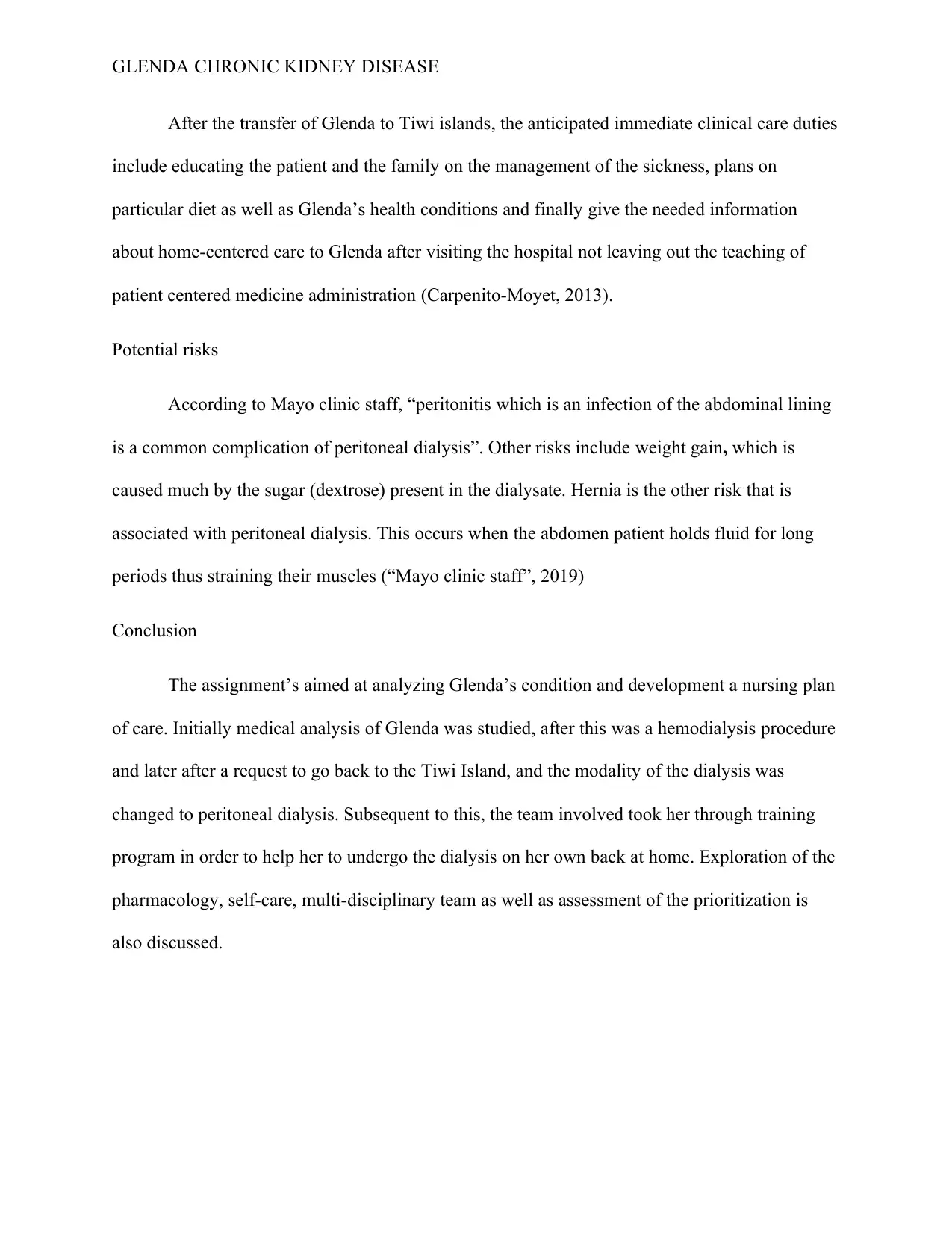
GLENDA CHRONIC KIDNEY DISEASE
After the transfer of Glenda to Tiwi islands, the anticipated immediate clinical care duties
include educating the patient and the family on the management of the sickness, plans on
particular diet as well as Glenda’s health conditions and finally give the needed information
about home-centered care to Glenda after visiting the hospital not leaving out the teaching of
patient centered medicine administration (Carpenito-Moyet, 2013).
Potential risks
According to Mayo clinic staff, “peritonitis which is an infection of the abdominal lining
is a common complication of peritoneal dialysis”. Other risks include weight gain, which is
caused much by the sugar (dextrose) present in the dialysate. Hernia is the other risk that is
associated with peritoneal dialysis. This occurs when the abdomen patient holds fluid for long
periods thus straining their muscles (“Mayo clinic staff”, 2019)
Conclusion
The assignment’s aimed at analyzing Glenda’s condition and development a nursing plan
of care. Initially medical analysis of Glenda was studied, after this was a hemodialysis procedure
and later after a request to go back to the Tiwi Island, and the modality of the dialysis was
changed to peritoneal dialysis. Subsequent to this, the team involved took her through training
program in order to help her to undergo the dialysis on her own back at home. Exploration of the
pharmacology, self-care, multi-disciplinary team as well as assessment of the prioritization is
also discussed.
After the transfer of Glenda to Tiwi islands, the anticipated immediate clinical care duties
include educating the patient and the family on the management of the sickness, plans on
particular diet as well as Glenda’s health conditions and finally give the needed information
about home-centered care to Glenda after visiting the hospital not leaving out the teaching of
patient centered medicine administration (Carpenito-Moyet, 2013).
Potential risks
According to Mayo clinic staff, “peritonitis which is an infection of the abdominal lining
is a common complication of peritoneal dialysis”. Other risks include weight gain, which is
caused much by the sugar (dextrose) present in the dialysate. Hernia is the other risk that is
associated with peritoneal dialysis. This occurs when the abdomen patient holds fluid for long
periods thus straining their muscles (“Mayo clinic staff”, 2019)
Conclusion
The assignment’s aimed at analyzing Glenda’s condition and development a nursing plan
of care. Initially medical analysis of Glenda was studied, after this was a hemodialysis procedure
and later after a request to go back to the Tiwi Island, and the modality of the dialysis was
changed to peritoneal dialysis. Subsequent to this, the team involved took her through training
program in order to help her to undergo the dialysis on her own back at home. Exploration of the
pharmacology, self-care, multi-disciplinary team as well as assessment of the prioritization is
also discussed.
⊘ This is a preview!⊘
Do you want full access?
Subscribe today to unlock all pages.

Trusted by 1+ million students worldwide
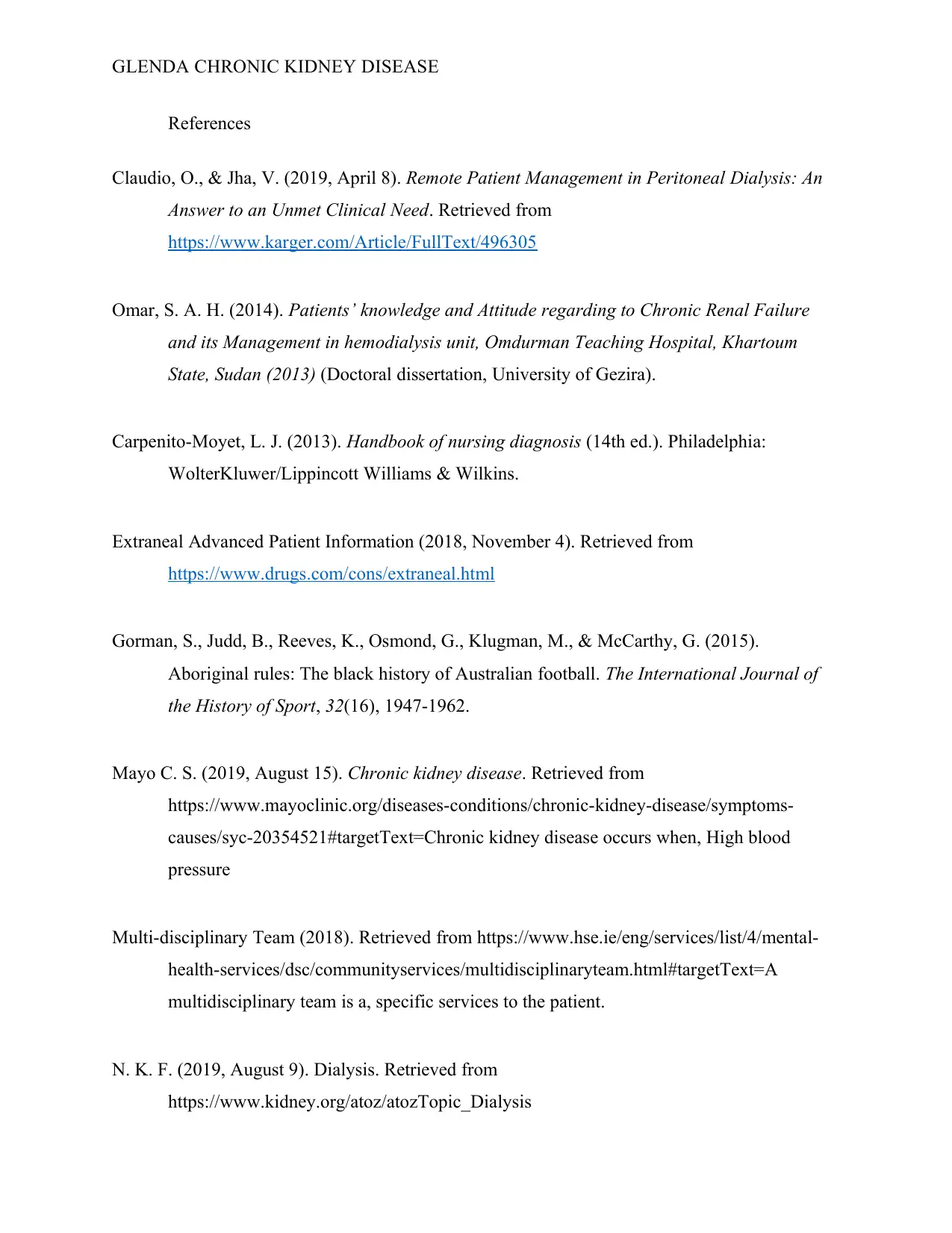
GLENDA CHRONIC KIDNEY DISEASE
References
Claudio, O., & Jha, V. (2019, April 8). Remote Patient Management in Peritoneal Dialysis: An
Answer to an Unmet Clinical Need. Retrieved from
https://www.karger.com/Article/FullText/496305
Omar, S. A. H. (2014). Patients’ knowledge and Attitude regarding to Chronic Renal Failure
and its Management in hemodialysis unit, Omdurman Teaching Hospital, Khartoum
State, Sudan (2013) (Doctoral dissertation, University of Gezira).
Carpenito-Moyet, L. J. (2013). Handbook of nursing diagnosis (14th ed.). Philadelphia:
WolterKluwer/Lippincott Williams & Wilkins.
Extraneal Advanced Patient Information (2018, November 4). Retrieved from
https://www.drugs.com/cons/extraneal.html
Gorman, S., Judd, B., Reeves, K., Osmond, G., Klugman, M., & McCarthy, G. (2015).
Aboriginal rules: The black history of Australian football. The International Journal of
the History of Sport, 32(16), 1947-1962.
Mayo C. S. (2019, August 15). Chronic kidney disease. Retrieved from
https://www.mayoclinic.org/diseases-conditions/chronic-kidney-disease/symptoms-
causes/syc-20354521#targetText=Chronic kidney disease occurs when, High blood
pressure
Multi-disciplinary Team (2018). Retrieved from https://www.hse.ie/eng/services/list/4/mental-
health-services/dsc/communityservices/multidisciplinaryteam.html#targetText=A
multidisciplinary team is a, specific services to the patient.
N. K. F. (2019, August 9). Dialysis. Retrieved from
https://www.kidney.org/atoz/atozTopic_Dialysis
References
Claudio, O., & Jha, V. (2019, April 8). Remote Patient Management in Peritoneal Dialysis: An
Answer to an Unmet Clinical Need. Retrieved from
https://www.karger.com/Article/FullText/496305
Omar, S. A. H. (2014). Patients’ knowledge and Attitude regarding to Chronic Renal Failure
and its Management in hemodialysis unit, Omdurman Teaching Hospital, Khartoum
State, Sudan (2013) (Doctoral dissertation, University of Gezira).
Carpenito-Moyet, L. J. (2013). Handbook of nursing diagnosis (14th ed.). Philadelphia:
WolterKluwer/Lippincott Williams & Wilkins.
Extraneal Advanced Patient Information (2018, November 4). Retrieved from
https://www.drugs.com/cons/extraneal.html
Gorman, S., Judd, B., Reeves, K., Osmond, G., Klugman, M., & McCarthy, G. (2015).
Aboriginal rules: The black history of Australian football. The International Journal of
the History of Sport, 32(16), 1947-1962.
Mayo C. S. (2019, August 15). Chronic kidney disease. Retrieved from
https://www.mayoclinic.org/diseases-conditions/chronic-kidney-disease/symptoms-
causes/syc-20354521#targetText=Chronic kidney disease occurs when, High blood
pressure
Multi-disciplinary Team (2018). Retrieved from https://www.hse.ie/eng/services/list/4/mental-
health-services/dsc/communityservices/multidisciplinaryteam.html#targetText=A
multidisciplinary team is a, specific services to the patient.
N. K. F. (2019, August 9). Dialysis. Retrieved from
https://www.kidney.org/atoz/atozTopic_Dialysis
Paraphrase This Document
Need a fresh take? Get an instant paraphrase of this document with our AI Paraphraser
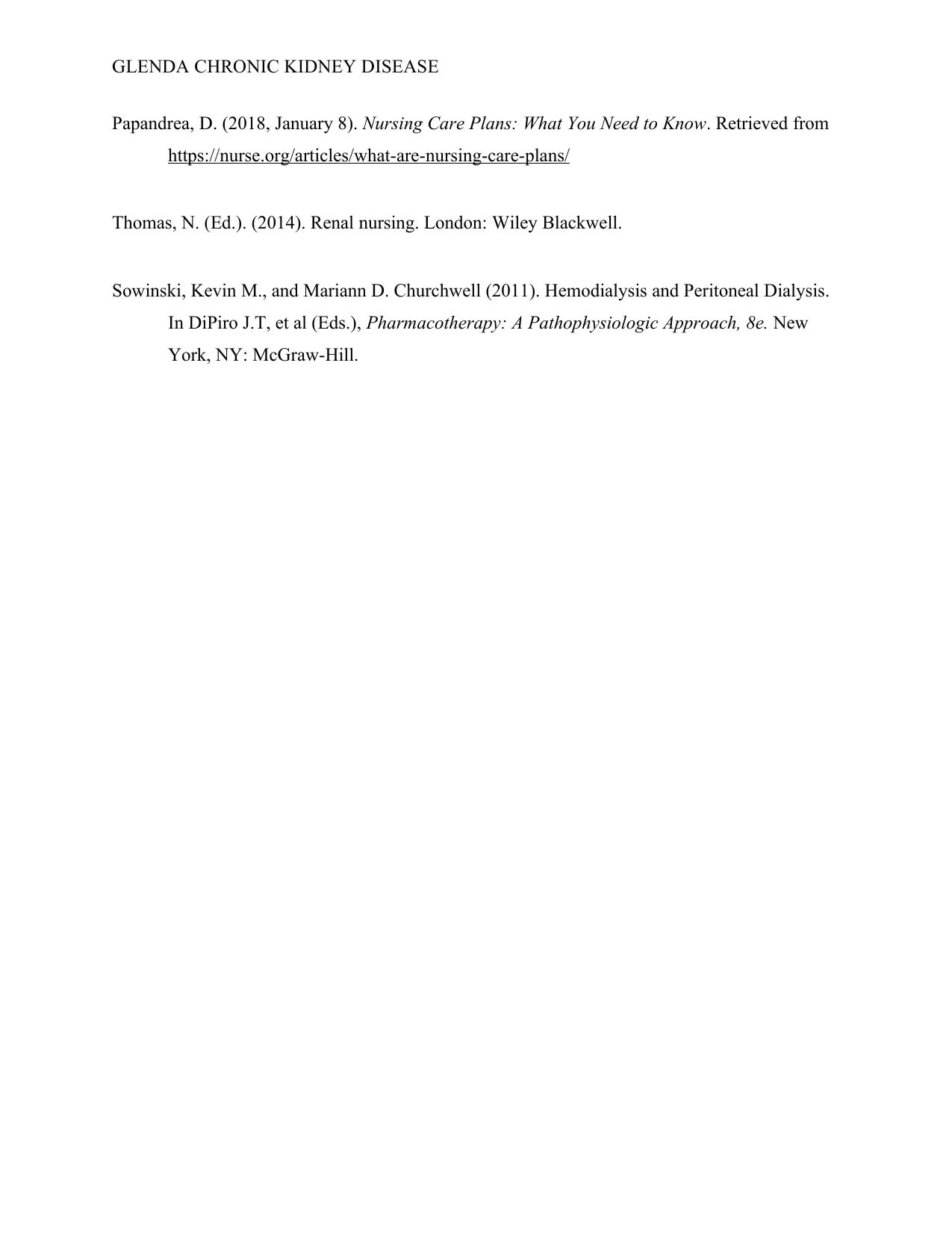
GLENDA CHRONIC KIDNEY DISEASE
Papandrea, D. (2018, January 8). Nursing Care Plans: What You Need to Know. Retrieved from
https://nurse.org/articles/what-are-nursing-care-plans/
Thomas, N. (Ed.). (2014). Renal nursing. London: Wiley Blackwell.
Sowinski, Kevin M., and Mariann D. Churchwell (2011). Hemodialysis and Peritoneal Dialysis.
In DiPiro J.T, et al (Eds.), Pharmacotherapy: A Pathophysiologic Approach, 8e. New
York, NY: McGraw-Hill.
Papandrea, D. (2018, January 8). Nursing Care Plans: What You Need to Know. Retrieved from
https://nurse.org/articles/what-are-nursing-care-plans/
Thomas, N. (Ed.). (2014). Renal nursing. London: Wiley Blackwell.
Sowinski, Kevin M., and Mariann D. Churchwell (2011). Hemodialysis and Peritoneal Dialysis.
In DiPiro J.T, et al (Eds.), Pharmacotherapy: A Pathophysiologic Approach, 8e. New
York, NY: McGraw-Hill.
1 out of 11
Your All-in-One AI-Powered Toolkit for Academic Success.
+13062052269
info@desklib.com
Available 24*7 on WhatsApp / Email
![[object Object]](/_next/static/media/star-bottom.7253800d.svg)
Unlock your academic potential
Copyright © 2020–2026 A2Z Services. All Rights Reserved. Developed and managed by ZUCOL.

